Treatment of Ebola patients and vaccinations
During the Ebola outbreak in the DR Congo in 2018 to 2020, various experimental therapeutics were used for the first time and evaluated in a study. Two antibody preparations, Inmazeb and Ebanga, were shown to be highly effective against the Zaire Ebola virus. At the end of 2020, the monoclonal antibodies were officially approved by the US Food and Drug Administration (FDA) for the treatment of Ebola virus disease.
In 2019, the Ebola vaccine Ervebo was approved for Europe by the European Commission. In 2020, the vaccine was officially approved by the FDA and qualified by the WHO for use in people over 18 years, excluding pregnant and breastfeeding women. Over 350,000 people have already been vaccinated with Ervebo in Guinea, as well as in the 2018-2020 Ebola outbreaks in the DRC. The vaccine has been available globally since January 2021. In 2020, the 2-component vaccine Zabdeno-and-Mvabea, to be used in people one year and older, was approved for Europe by the European Medicines Agency (EMA).
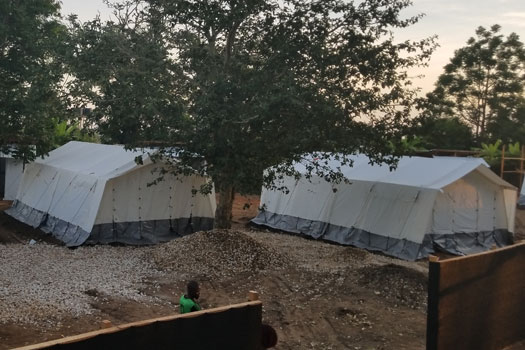
The pharmaceutical company Janssen is working with the WHO to prequalify the vaccine to drive wider access to immunisation in African countries.
In addition to vaccinations, the disease is also treated symptomatically or symptom-relievingly in order to alleviate the course of the disease. Depending on the severity of the disease, the following treatment measures are applied:
- Infusions to stabilise the fluid, glucose and electrolyte balance
- Antipyretics
- Analgesics
- Medicines against diarrhoea and vomiting
- Antibiotics
- Medicines to stabilise blood pressure
Ebola outbreaks in Africa: current situation and epidemics in recent years
The largest outbreak of EVD to date (as of June 2021) occurred in West Africa between 2014 and 2016, including primarily in Liberia, Guinea and Sierra Leone, with around 28,000 people falling ill and more than 11,000 deaths. In March 2016, the epidemic was declared over by the WHO. A country is considered free of Ebola if no further Ebola cases occur for a period of 42 days (two maximum incubation periods). However, increased vigilance should be maintained to quickly detect late-occurring Ebola cases and prevent the virus from spreading again.
Between 2018 and 2020, the DR Congo experienced the second most severe Ebola outbreak ever documented in the provinces of North Kivu, Ituri and Sud Kivu. Over a two-year period, the virus spread dramatically, recording over 3,300 cases of illness, of which more than 2,100 were fatal. After the first cases of Ebola also occurred in neighbouring Uganda in June 2019, WHO declared a public health emergency of international concern in July 2019 due to the health risk. The epidemic was only declared over in June 2020 after no new infections could be detected.
In February 2021, there was a new outbreak of Ebola in the DR Congo as well as in Guinea. In the DR Congo, twelve people have been confirmed to have been infected with the virus since the beginning of February 2021, six of whom died. The national Ministry of Health declared the outbreak over on 3 May 2021. This was the twelfth outbreak in the recent history of the DR Congo, which has repeatedly struggled with Ebola and other epidemics.
In Guinea, the virus was detected in a nurse who died at the end of January 2021. Furthermore, a group of visitors to a funeral experienced diarrhoea, vomiting and bleeding symptoms. The Ebola viruswas detected in a total of 23 people, twelve of whom died of the disease. Genetic analyses were able to show that the outbreak apparently goes back to the same viral strain as the Ebola epidemic in 2014 to 2016 in West Africa. Since effective vaccines and medications against the Zaire Ebola virus are now available, measures to contain the virus were more effective in this renewed outbreak of the virus. At the end of February 2021, several thousand people in the vicinity of infected people got vaccinated. As no further cases were reported by the end of the 42-day incubation period, the outbreak in Guinea was declared over on 19 June.
In October 2021, we received the prestigious Else Kröner Fresenius Award for Development Cooperation in Medicine 2021 for our project for improved epidemic prevention and control in the DR Congo. Learn more about the project in the video.
What measures are being taken to contain and prevent an Ebola outbreak?
In order to prevent and contain an Ebola outbreak, measures must be taken as quickly as possible to trace the chain of infection and prevent its further spread. For this purpose, it is clarified with whom the affected person had previous contact in order to monitor possibly infected people and to be able to take direct measures in case of an outbreak of symptoms.
Contact persons are also educated about precautionary measures to protect themselves from infection. As soon as Ebola is suspected, the patient is placed in isolation wards or Ebola treatment centres in hospitals. In addition, the further measures are important.
- Cleaning, disinfection or disposal of items that may have been contaminated by body fluids.
- Equipping medical staff with special personal protective equipment in hospitals and mobile clinics
- Strict safety precautions for patient transports
- Dignified burial of the deceased in compliance with safety measures
- Vaccination of medical staff
- Ring vaccinations to protect relatives and other contacts of Ebola infected persons
- Ebola isolation ward
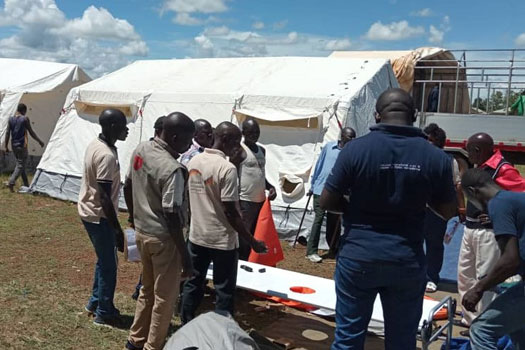
In a study conducted by WHO and the National Research Institute of the Democratic Republic of Congo from August 2018 to March 2019, in which 91,492 first and second contacts of infected people and 28,888 doctors and aid workers were vaccinated, and data were finally collected from 93,965 at-risk patients, the effectiveness of ring vaccination was 97.5 per cent.
The chances of survival of those infected by the disease also increased after vaccination. The ring vaccinations are subsequently highly valued and give hope for an effective containment of Ebola outbreaks.
However, the measures can only be effective if the population is aware of the correct behaviour with infected people and the disease. Educational measures are therefore among the most important long-term preventive measures.
By spreading knowledge about protection against the disease, its symptoms and how to deal with a possible infection, future epidemics can be avoided. Hygiene training, improved access to clean drinking water and the availability of health facilities as well as regulated waste management in villages and health facilities also contribute to reducing the risk of epidemics.
Our commitment against Ebola: education, prevention and medical aid
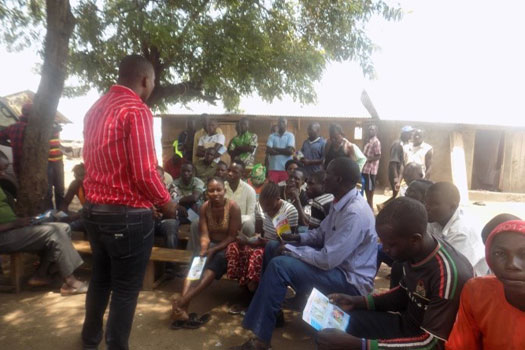
For many years, Malteser International has been active in countries that are most at risk of an outbreak of Ebola to prevent or contain the spread of the virus, including Guinea and Liberia as well as the DR Congo.
Raising awareness of the Ebola virus and educating people about appropriate prevention measures is of utmost importance. During the last devastating Ebola epidemics in Guinea and Liberia, as well as during the more recent outbreaks since 2018 in the DR Congo, we have informed residents about the risks of infection, prevention through personal and food hygiene, and appropriate behaviour in the case of symptoms.
In our community awareness campaigns, we follow a participatory approach: with the so-called People First Impact method (P-FIM), we put the people at the centre of the measures and listen to the communities first. The aim is to understand their understanding of the disease and existing hygiene measures.
This is the only way to reduce possible mistrust and prejudice and to develop effective measures that are supported by the communities. Read more about P-FIM and Ebola in one of our articles. Other measures include interactive radio broadcasts and songs to raise awareness of the disease, door-to-door sensitisation and the distribution of posters and flyers.
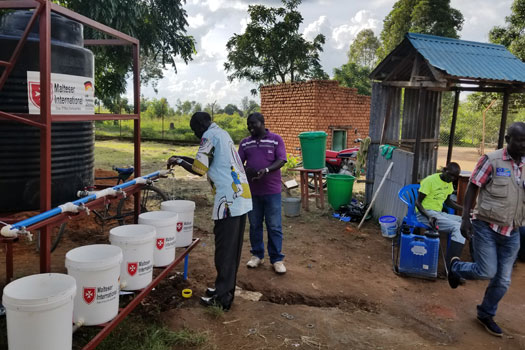
In terms of prevention, we regularly conduct further training for medical staff and set up protective measures in cities threatened by outbreaks in order to prevent infections and to be able to detect first symptoms at an early stage. The training of health staff and national health management teams is fundamental to improve the prevention and control of Ebola and other infectious diseases.
Our holistic approach also includes creating improved water and sanitation facilities and raising awareness of hygiene practices. Furthermore, we are establishing health zones with emergency supplies such as protective equipment, testing materials and medicines that can be used quickly in the event of a new outbreak. An isolation unit is also ready in case of an outbreak. In addition, we supply personal protective equipment and suits to health centres to protect care workers from infection.
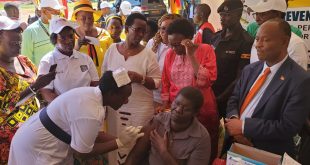
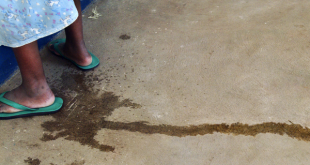


Vaccination is the way to go.
We must all get vaccinated
There should be sensitization to the local community